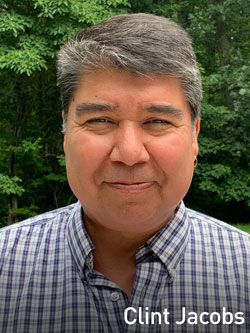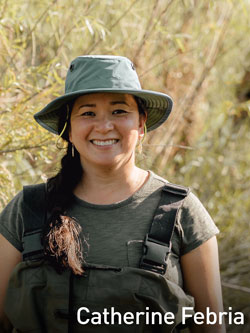 The University of Windsor National Urban Park Hub will focus on the co-creation of a national urban park in Windsor and provide expert advice as Parks Canada develops its National Urban Park Policy. (Photo by University of Windsor)
The University of Windsor National Urban Park Hub will focus on the co-creation of a national urban park in Windsor and provide expert advice as Parks Canada develops its National Urban Park Policy. (Photo by University of Windsor)
WINDSOR, Ont. — A trio of University of Windsor faculty have established Canada’s first research, teaching and community engagement project focused on the creation of national urban parks.
The University of Windsor National Urban Park Hub (UW-NUPH) launched on April 1 after a $1.2 million contribution from Parks Canada with match funding from the University and will be led by Healthy Headwaters Lab Director Catherine Febria, Faculty of Science Indigenous Knowledge Keeper Clint Jacobs and Centre for Cities Director Anneke Smit.
Over the next two years, the innovative hub for research and engagement will focus on the co-creation of a national urban park in Windsor and provide expert advice as Parks Canada develops its National Urban Parks Policy, which will be the mechanism for designating new national urban parks across Canada.
“The National Urban Parks Program represents the next evolution for Parks Canada whose history over 110 years has provided Canadians a system of national parks, national historic sites, national marine conservation areas, and Rouge National Urban Park,” said the Honourable Steven Guilbeault, Minister of Environment and Climate Change and Minister responsible for Parks Canada.
 “The Program will be grounded in science, Indigenous Knowledge, and local perspectives. Research and collaboration with academic partners, such as the new University of Windsor National Urban Park Hub, will enable us to blend this knowledge and bring people together.”
“The Program will be grounded in science, Indigenous Knowledge, and local perspectives. Research and collaboration with academic partners, such as the new University of Windsor National Urban Park Hub, will enable us to blend this knowledge and bring people together.”
The national urban parks program is built on the three foundational pillars of conserving nature, connecting people with nature, and advancing reconciliation with Indigenous peoples.
The establishment of the Knowledge Keeper Table and advancing the concept of an Indigenous Stewardship Centre in the city will constitute one of the UW-NUPH's primary objectives.
“While Parks Canada continues to pursue co-management agreements with local rights-holding First Nations, the Table will complement those efforts by engaging with urban Indigenous populations and First Nations across the traditional territory,” said Jacobs, recently appointed as a faculty member and Indigenous Knowledge Keeper in the Department of Integrative Biology.
“The UWindsor national urban park hub will foster the space needed to co-create wise and ethical practises for the inclusion of culture, ceremony and language as part of Indigenous-led stewardship in the city.”
 The Healthy Headwaters Lab, directed by Dr. Febria, will shepherd the University’s science role and advance a plan for ecological monitoring and mentorship of Indigenous stewards in the park. Her team will continue to measure biodiversity and water quality in habitats throughout the Ojibway Prairie Complex and Traditional Territory.
The Healthy Headwaters Lab, directed by Dr. Febria, will shepherd the University’s science role and advance a plan for ecological monitoring and mentorship of Indigenous stewards in the park. Her team will continue to measure biodiversity and water quality in habitats throughout the Ojibway Prairie Complex and Traditional Territory.
“Our ongoing work across Ojibway Park and community-based relationships across the region will provide a foundation for site-based plans related to conservation and restoration, while our collaborations with both Indigenous Knowledge Keepers Table and the Centre for Cities will inform the implementation of ethical and wise practices across the national parks program,” said Febria.
“We hope to offer an example of how university researchers can support Indigenous-led stewardship not just in Windsor, but in national urban parks across the country."
Directed by Dr. Smit, the Centre for Cities will provide research and engagement on inclusive and sustainable city-building and equitable place-making within the context of creating new national urban parks.

“How does a national urban park fit into a city? That’s the question the Centre for Cities’ work will explore,” said Smit, associate professor at the Faculty of Law.
“The development of the park needs to honour the diverse histories and experiences of all residents of Windsor and Essex County. Through engagement and collaboration with a range of community partners, we will work to ensure the Ojibway National Urban Park will both help protect, and foster access to, nature in the city."
"The Government of Canada is once again taking action to better connect Canadians with nature by contributing to the new National Urban Park Hub at the University of Windsor”, said Irek Kusmierczyk, member of Parliament for Windsor-Tecumseh.
“This Hub will allow the university to gather key data related to conserved and natural areas at the heart of large urban settings while ensuring that local Indigenous voices and perspectives are at the forefront of the planning for the proposed new national urban park in Windsor."
The UW-NUPH represents the culmination of years of work by passionate and invested stakeholders and rights holders, including conservation organizations, governments, Indigenous communities and everyday citizens.
“The establishment of the National Urban Park Hub at our world-class University of Windsor is a recognition of all the work that needs to be done with regard to endangered and species-at-risk in a rare and threatened ecosystem while engaging in reconciliation with First Nations," said Brian Masse, member of Parliament for Windsor-West.
"Hopefully, this is the beginning of a series of milestones from Parks Canada in reaching a co-management agreement with the indigenous community and land transfers with the City of Windsor and the Province of Ontario to establish Ojibway National Urban Park.”
Read the full story about the University of Windsor National Urban Park Hub.
